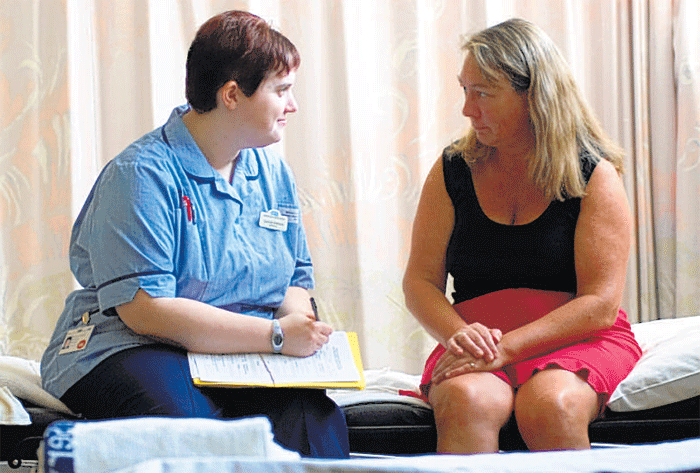Profile: The MS Nurse
A multiple sclerosis specialist helps sufferers to carry on living their lives

Your support helps us to tell the story
From reproductive rights to climate change to Big Tech, The Independent is on the ground when the story is developing. Whether it's investigating the financials of Elon Musk's pro-Trump PAC or producing our latest documentary, 'The A Word', which shines a light on the American women fighting for reproductive rights, we know how important it is to parse out the facts from the messaging.
At such a critical moment in US history, we need reporters on the ground. Your donation allows us to keep sending journalists to speak to both sides of the story.
The Independent is trusted by Americans across the entire political spectrum. And unlike many other quality news outlets, we choose not to lock Americans out of our reporting and analysis with paywalls. We believe quality journalism should be available to everyone, paid for by those who can afford it.
Your support makes all the difference.Although there is no cure for multiple sclerosis, a disease of the central nervous system, Carrie Dobson, 29, MS nurse specialist at Southampton University Hospital Trust, believes that the coming few years will see major changes in its treatment.
"After many years of injections and infusions, the first oral treatment for MS will be made available next year and while it isn't without its side effects, it could utterly alter the lives of sufferers and their families from now on," she says.
Largely hospital-based, where she and a colleague manage a caseload of 350 patients on drug therapy, Dobson not only helps take pressure off doctors by co-ordinating and monitoring treatments, but she also ensures that patients learn more about the disease, which is usually diagnosed in the 20-to-30 age group.
Apart from helping run several clinics each month, including two out-patient clinics a week for symptom management and drug follow-up, there are also regular drug information sessions and dedicated clinics for patients recently diagnosed as having MS and in need of basic information.
While most procedures are carried out in the outpatients department, Dobson makes time to go out into the community - where she shows new patients how to self-inject, for example - and routinely gets involved with the work of various MS charity groups.
"It's part of my role to help educate patients about the disease and allow them to talk through any problems they are having," she says, "but there is also a patient helpline if they need a quick answer to something.
"Coming into contact with newly diagnosed patients, long-term patients and patients whose condition has suddenly changed or exacerbated gives me a very good understanding of how the different stages of the disease can be managed," she adds.
Although MS is the most common disabling neurological disease among young adults, it affects around 100,000 people in the UK of all ages.
Despite the fact that her patients can be 16 or 60, Dobson says she tries hard to identify with patients of all ages.
"I feel great compassion for teenagers diagnosed with MS, but I also empathise with people of my age who may be on the brink of taking life-changing decisions around careers or starting families.
"But although there is no cure as far as we know, an awful lot can be done as regards treatment, support and managing symptoms and I always tell my new patients that it doesn't have to be as terrible as it first sounds."
Ongoing research into MS suggests that the disease is triggered by a number of different things, including being exposed to a virus as a teenager and environmental issues. But the jury is still out on why there should be higher numbers of MS sufferers in Scotland than there are in England, for example.
"This is a great time to be an MS specialist and although I'd like all the answers, I am sure these will come in time. For the present, my job is to explain as much as I can to my patients, show them how to manage the disease and help them keep on living their lives."
Join our commenting forum
Join thought-provoking conversations, follow other Independent readers and see their replies
Comments